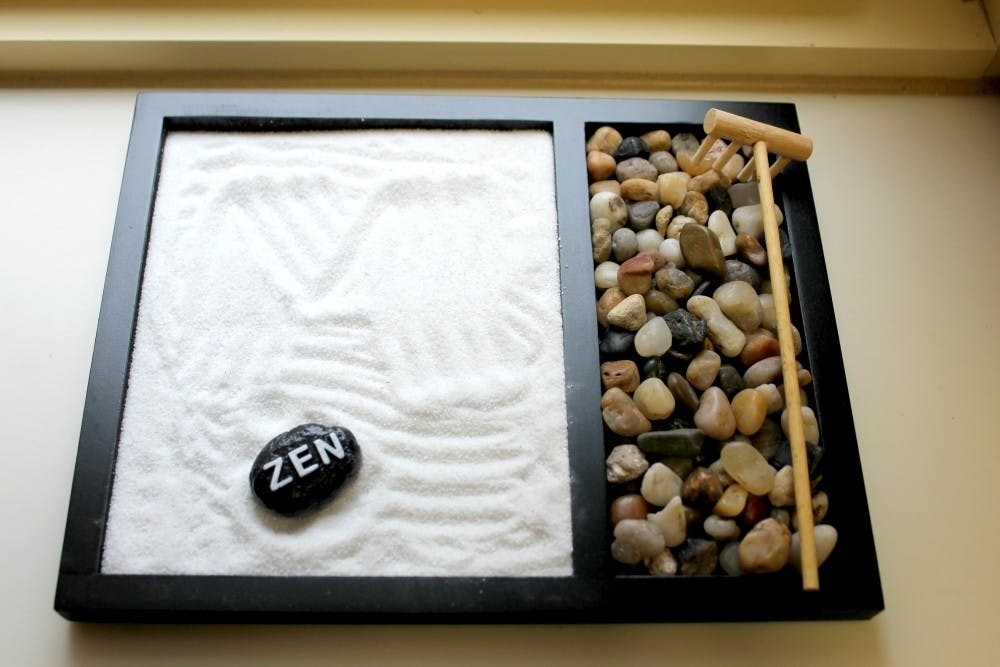The Mindfulness and Contemplative Inquiry Center, located in 128 McGuffey Hall, will celebrate its first year anniversary in March.
The center focuses on using mindfulness and contemplative inquiry to improve the quality of teaching and learning. Currently, the center offers two courses for credit and holds drop-in meditation every Tuesday and Wednesday at 10:30 a.m. The center also works with faculty through faculty learning communities.
Suzanne Klatt, the director of the center, likes to define mindfulness in the words of Jon Kabat-Zinn, a pioneer in the field of secular mindfulness-based stress reduction: "[Mindfulness is] the awareness that arises when we are paying attention in the present moment, on purpose, nonjudgmentally."
Mindfulness is not about relaxing, but the stress-reduction that sometimes accompanies meditation is a welcome side-effect.
Klatt has been involved with the center from the very beginning. Back in 2011, Klatt and her colleagues Katie Egart and Ellenmarie Wahlrab developed a working group for mindfulness. Klatt was providing stress reduction and mindfulness classes for faculty through faculty learning communities, and other members of the group were interested in applying mindfulness to their teaching.
Their first proposal to create a center was denied, but their second proposal was approved. The Center's space in McGuffey was officially opened last March.
The center has had a busy first year.
This semester there are 21 students enrolled in EHS401/501 : Life Meaning and Mindfulness, a three-credit-hour class, and there are 25 students enrolled in EHS422/522 : Contemplative Inquiry Lab, taken for one credit. The classes have been temporary as the center gauges students' interest, and Klatt plans to make them permanent starting next semester.
The center also continues to work with faculty learning communities. To date, the center has worked with over 50 faculty members about using mindfulness in the classroom.
The center held Mindfulness Week last fall, a week-long event where the mindful practices offered each day focused on a theme, such as compassion or wellness.
Mitchell Singstock is currently enrolled in the Lab class, and will be a teaching assistant for the course next semester. Singstock was involved in meditation at his high school and was looking to continue to learn meditation at Miami.
Singstock finds meditation useful as a student because it helps him control his stress. He is also excited about the compassion meditation he is learning in the course.
Enjoy what you're reading?
Signup for our newsletter
"We have a proclivity towards compassion, but it's a skill that has to be trained as well," said Singstock, who is hoping to have a career in medicine.
Compassion is very important in this field, especially in the hospital setting - otherwise the job can be very draining, he added.
Singstock hopes that there will be more outreach to students because he believes that students are uniquely positioned to benefit from contemplative practices.
"I think that students have the most to gain from this, because we're at a particular position in our lives where a whole lot is unknown and life inherently has stresses," said Singstock.
Krista Mersino, who took the Lab class as a sprint course last fall, said mindfulness improved her ability as a student.
"[Mindfulness] allowed me not to check out as much and really focus on the material," said Mersino. "I think it made me a better learner."
Hakeem McGee, who took the Life Meaning and Mindfulness course last fall and is currently enrolled in the Lab, also saw a positive impact on his learning.
"I've noticed that by practicing these tools I've become more focused in class, I've become more mindful while taking notes, I doze off less, I daydream less, I'm more attentive," said McGee.
Klatt is excited for the Center's future. Right now, the center is working on planning an event for April, "Sit for Six." The event, which they hope they can pair with a fundraiser, will encourage people to engage in meditation for six days in a row.
The center is also looking into teaching practices outside of meditation that students have expressed interest in, such as yoga.
Mersino admits that she does not use mindfulness as much as she has hoped to, but she still sees an impact on her everyday life.
"My vision was I was going to meditate everyday - now it's more like every month when I remember," said Mersino. "But I'm in class, and I still notice when my thoughts aren't focused in class, and I kind of gently bring my thoughts back to being present"




